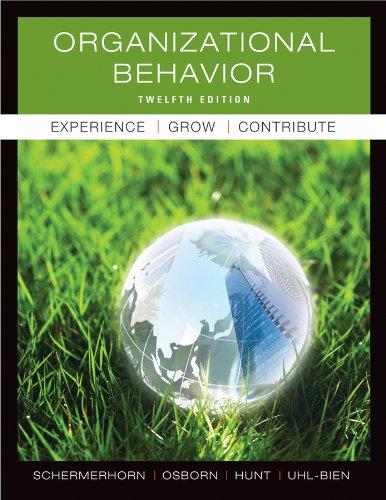This exercise focuses on issues related to workers facing international assignments. It illustrates that those workers face
Question:
This exercise focuses on issues related to workers facing international assignments. It illustrates that those workers face a multitude of issues. It further demonstrates that managers who want employees to realize the maximum benefits of international assignments should be aware of, and prepared to deal with, those issues. Some of the topics that are easily addressed with this exercise include the need for culture and language training for the employees and their families and the impact that international assignments may have on an employee’s family and how that may affect an employee’s willingness to seek such assignments.
Procedure 1. Form into “families” of four or five. Since many students today have only one parent at home, it is helpful if some groups do not have students to fill both parental roles in the exercise. Each student is assigned to play a family member and given a description of that person.
2. Enter into a 20-minute discussion to explore how a proposed overseas assignment will affect the family members. Your goal is to try to reach a decision about whether the assignment should be taken. You must also decide whether the entire family or only the family member being offered the assignment will relocate.
The assignment is for a minimum of two years, with possible annual extensions resulting in a total of four years, and your family, or the member offered the assignment, will be provided, at company expense, one trip back to the states each year for a maximum period of 15 days. The member offered the assignment will not receive any additional housing or cost-of-living supplements described in the role assignment if he or she chooses to go overseas alone and can expect his or her living expenses to exceed substantially the living allowance being provided by the company. In your discussion, address the following questions:
1. What are the most important concerns your family has about relocating to a foreign country?
2. What information should you seek about the proposed host country to be able to make a more informed decision?
3. What can the member offered the assignment do to make the transition easier if he or she goes overseas alone? If the whole family relocates?
4. What should the member offered the assignment do to ensure that this proposed assignment will not create unnecessary stress for him or her and the rest of the family?
5. What lessons for managers of expatriate assignees are presented by the situation in this exercise?
Try to reach some “family” consensus. If a consensus is not possible, however, resolve any differences in the manner you think the family in the role descriptions would ultimately resolve any differences.
3. Share your answers with the rest of the class. Explain the rationale for your answers and answer questions from the remainder of the class.
4. (Optional) After each group has reported on a given question, the instructor may query the class about how their answers are consistent, or inconsistent, with common practices of managers as described in the available literature.
Descriptions of Family Members Person Being Offered Overseas Assignment This person is a middle- to upper-level executive who is on a fast track to senior management. He or she has been offered the opportunity to manage an overseas operation, with the assurance of a promotion to a vice presidency upon return to the states. The com pany will pay all relocation expenses, including selling costs for the family home and the costs associated with finding a new home upon return. The employer will also provide language training for the employee and cultural awareness training for the entire family. The employee will receive a living allowance equal to 20 percent of his or her salary. This should be adequate to provide the family a comparable standard of living to that which is possible on the employee’s current salary.
Spouse of the Person Offered an Overseas Assignment (Optional)
This person is also a professional with highly transferable skills and experience for the domestic market. It is unknown how easily he or she may be able to find employment in the foreign country. This person’s income, though less than his or her spouse’s, is necessary if the couple is to continue paying for their child’s college tuition and to prepare for the next child to enter college in two years. This person has spent 15 years developing a career, including completing a degree at night.
Oldest Child This child is a second-semester junior in college and is on track to graduate in 16 months. Transferring at this time would probably mean adding at least one semester to complete the degree. He or she has been dating the same person for over a year; they have talked about getting married immediately after graduation, although they are not yet formally engaged.
Middle Child This child is a junior in high school. He or she has already begun visiting college campuses in preparation for applying in the fall. This child is involved in a number of school activities; he or she is a photographer for the yearbook and plays a varsity sport. This child has a learning disability for which services are being provided by the school system.
Youngest Child This child is a middle school student, age 13. He or she is actively involved in Scouting and takes piano lessons.
This child has a history of medical conditions that have required regular visits to the family physician and specialists.
This child has several very close friends who have attended the same school for several years.
Step by Step Answer:

Organizational Behavior
ISBN: 9780470878200
12th Edition
Authors: John R. Schermerhorn, Mary Uhl-Bien, Richard N. Osborn





